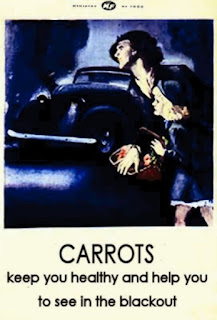"Doctor Carrot" arrived in November 1941. The Ministry of Agriculture promoted carrots heavily as a substitute for other more scarce vegetables and meat, and as a sweetener in desserts in the absence of sugar, which was rationed to 8 ounces per adult per week. The Dr. Carrot character carried a bag labelled "Vit A" as the Ministry of Food recognised the value of the carrot in providing high levels of this vital vitamin, via beta-carotene. People were encouraged to "take the doctor's advice" and eat more carrots to be fit for the ensuing winter.
It was reported that the shortage of batteries would no longer be a concern as people would "develop cats eyes" and see better in the dark. Carrot were considered to be the most important of vegetables from a health point of view and it was hoped that Dr Carrot would carry out his mission as successfully as Potato Pete did for the potato.
During the 1940 Blitzkrieg, the Luftwaffe often struck under the cover of darkness. In order to make it more difficult for the German planes to hit targets, the British government issued citywide blackouts. The Royal Air Force were able to repel the German fighters in part because of the development of a new, secret radar technology. The on-board Airborne Interception Radar (AI), first used by the RAF in 1939, had the ability to pinpoint enemy bombers before they reached the English Channel. But to keep that under wraps, according to Stolarczyk’s research pulled from the files of the Imperial War Museum, the Mass Observation Archive, and the UK National Archives, the Ministry provided another reason for their success: carrots.
In 1940, RAF night fighter ace, John Cunningham, nicknamed “Cat’s Eyes”, was the first to shoot down an enemy plane using AI. He’d later rack up an impressive total of 20 kills—19 of which were at night. According to “Now I Know” writer Dan Lewis, also a Smithsonian.com contributor, the Ministry told newspapers that the reason for their success was because pilots like Cunningham ate an excess of carrots.
In February 1941 the Minister of Food gave his monthly report on the food situation in the UK and stated "That the consumption of carrots has increased following the Ministry's publicity campaigns. Supplies are still ample."
In wartime Britain children would very often use the humble carrot as a substitute for the fruit they could no longer obtain. Similarly the Government also issued a poster with the slogan 'Carrots keep you healthy and help you see in the blackout' to promote the humble carrot.



No comments:
Post a Comment